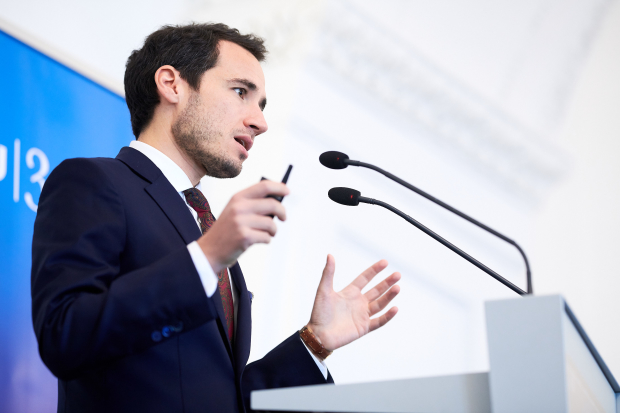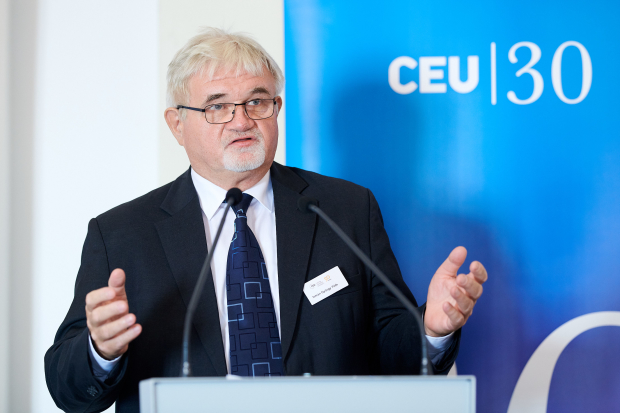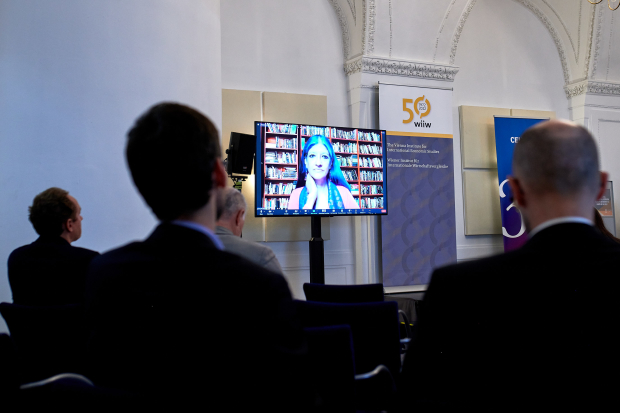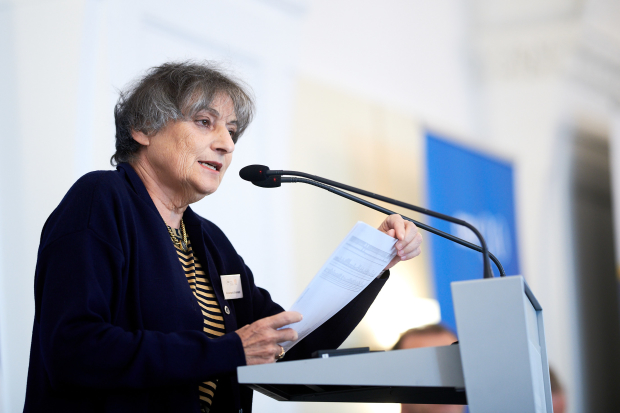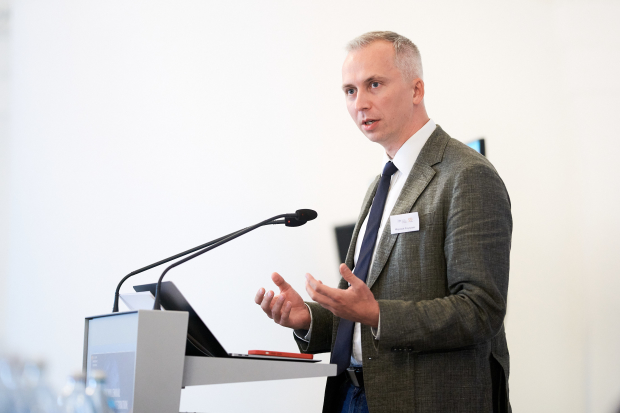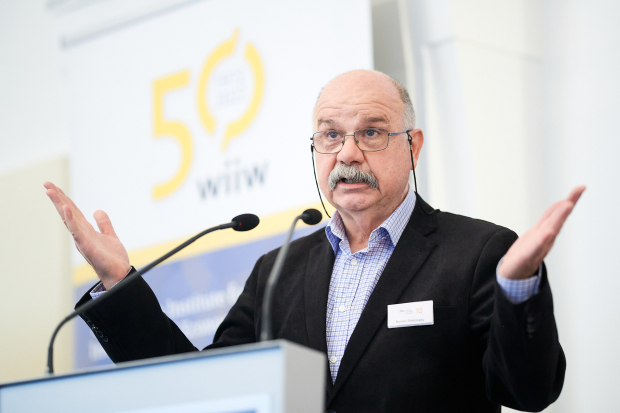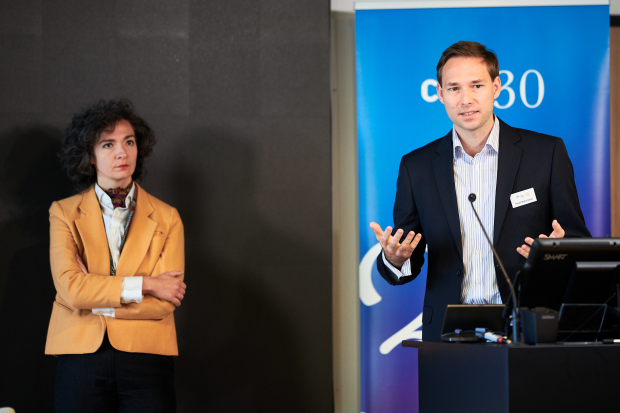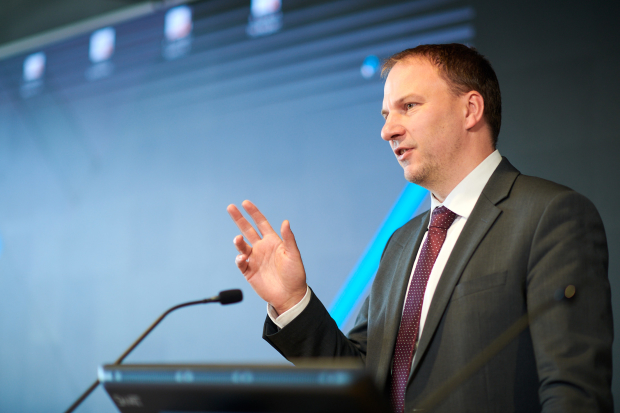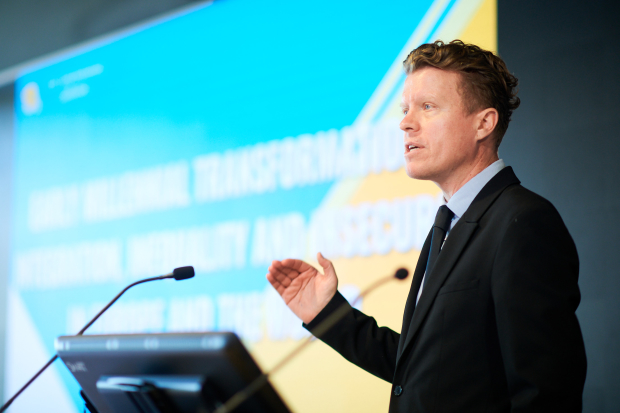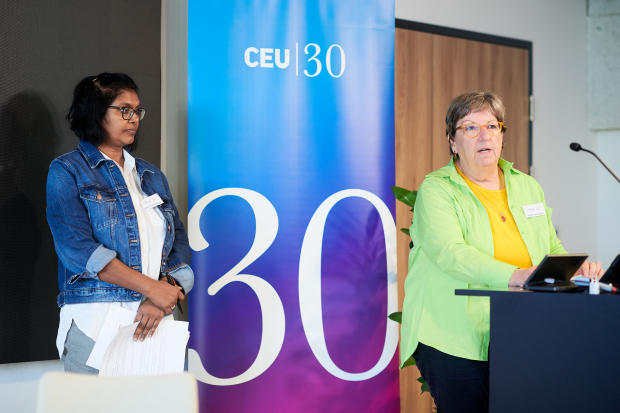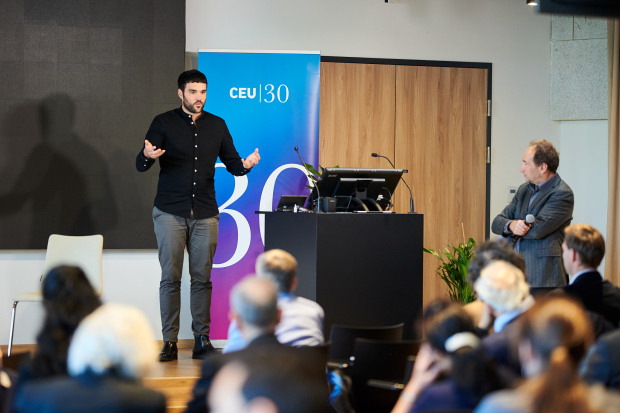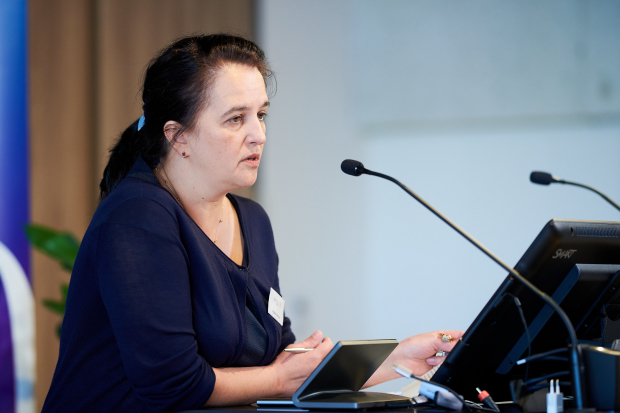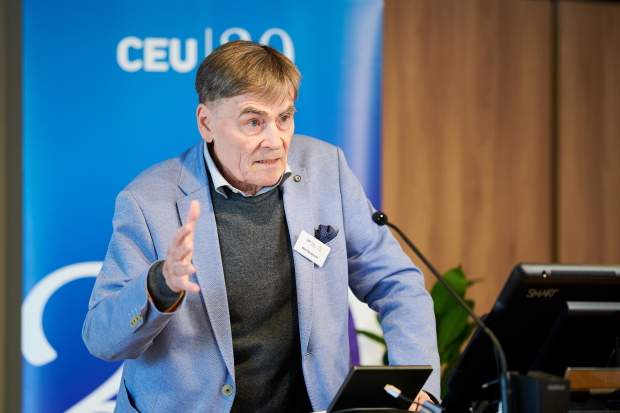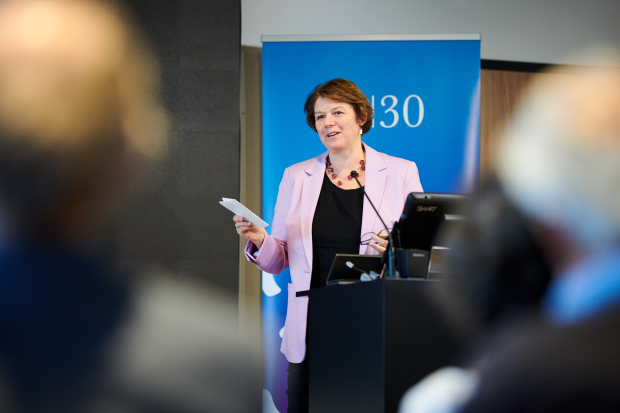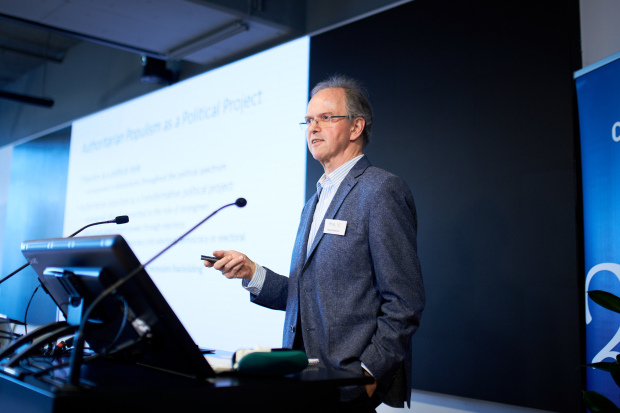Joint Anniversary Conference with the CEU in Vienna: Integration, Inequality and Insecurity in Europe and the World
09 November 2022
wiiw and CEU discussed Ukraine war, energy crisis and pandemic with speakers from around the world
image credit: Daniel Vegel
On 22 and 23 September the Vienna Institute for International Economic Studies (wiiw) and the Central European University (CEU) gathered scholars from across the globe as well as 70 guests to discuss the challenges of our time in a two-day conference entitled ‘Early Millennial Transformations: Integration, Inequality and Insecurity in Europe and the World’.
Day 1 took place in the Oratory of the Austrian National Library (Österreichische Nationalbibliothek) and focused on the challenges of integration and comparative perspectives from different countries.
The conference began with welcome addresses by Shalini Randeria, Rector of the Central European University, Hannes Swoboda, President of wiiw, Michael Landesmann, former Scientific Director of wiiw and Bela Greskovits, Professor of Political Science at the CEU, who called the event an ‘intellectual fiesta’.
Session 1: Challenges of Integration
In part 1, which was chaired by political scientist Dorothee Bohle (University of Vienna), historian Jeremy Adelman (Princeton University) put the current turning point in our history, or ‘Zeitenwende’, into a historical perspective. In his opinion, neither the catastrophists nor the advocates of a revival of liberal internationalism (such as the administration of US President Joe Biden) are right. Rather, the future will be determined by ‘muddling through’ – on the one hand being able to handle the most dramatic consequences of shocks, such as Russia’s invasion of Ukraine or the COVID-19 pandemic, while on the other hand being unable to solve fundamental problems such as climate change. For Adelman, this will open up a huge gulf between the global north and south.
Ivan Krastev from the Institute for Human Sciences (IWM) and the Centre for Liberal Strategies discussed the claim that globalisation is in a deep crisis because of COVID-19 and the war in Ukraine. If this is true, he argued, Europe will be the biggest winner because of its strong political and economic integration. Trends like on-shoring (moving production from faraway destinations like Asia) or friend-shoring (moving production to countries that are reliable in times of geopolitical crisis) are very much in favour of Europe’s economic setup. He claimed that companies, capital and people usually don’t move far but instead prefer closer destinations, as the history of European economic integration has shown. For Krastev the war in Ukraine challenges four major assumptions of European integration. 1) That economic interdependence is a source of security. The current ‘weaponisation’ of natural gas by Russia is a major source of insecurity. 2) That military power no longer matters. Because Europe is militarily weak, it can’t help Ukraine sufficiently and is politically marginalised in the conflict. 3) For companies, the economic logic has changed from efficiency to resilience, i.e. reliable production in close geographical vicinity to the market is preferable to the cost-cutting, just-in-time manufacture of goods. 4) The prevailing economic paradigm in the EU has also dramatically changed from fiscal and monetary austerity to outspending the crisis, i.e. dealing with the crisis with massive public spending in order to minimise its effects.
Fiona Tregenna (Johannesburg University) painted a broad picture of the consequences of industrialisation in Africa. For a very long time the continent failed to seriously industrialise. But although it has now gained speed and drives regional economic integration throughout the continent, according to her this is not the same as in Europe. On the contrary, industrialisation in Africa is far more ambitious and faster than in Europe, with tremendous consequences in many areas, such as value chains, trade, structural change, winners and losers in societies as well as among countries, digitalisation and climate change. As history has proven, industrialisation is about much more than economic growth – it’s a broader push for human development, which is also the case in Africa.
Ivano Cardinale (Goldsmiths, University of London) and Michael Landesmann (wiiw) used a theoretical framework that builds on the classical understanding of the interplay between economic structures and political conflicts going back to François Quesnay and David Ricardo. The framework analysed the constraints that economic mechanisms impose on the trajectories of political-economic systems when they are subject to particular political processes and policy interventions. They used the framework to interpret the key challenges of European integration in the light of current developments within and outside Europe (the pandemic, the Ukraine war, the energy and inflation crisis, the trend towards global multipolarity).
István György Tóth (Tarki Social Research Institute) started his presentation with the premise that the long-term survival of the European integration project requires at least some degree of ‘similarisation’ of social structures, demographic patterns and shared values (social, economic and political) across the European community. He then proceeded to identify some key indicators for addressing social convergence and showed how the CEE (and the core) members of the EU have performed in the past 30 years. Questions were raised about the longstanding internal heterogeneity of the CEE region.
Session 2: Comparative Perspectives from Different Countries
India: The making of a catastrophe: COVID-19 and the Indian economy
In part 2, chaired by Michael Landesmann, Jayati Ghosh (University of Massachusetts) showed how the COVID-19 pandemic has been the worst health calamity in India for at least a century. But beyond the direct health and mortality impacts, the economic and social devastation experienced by the country merits the description ‘catastrophe’. This cannot be ascribed to the disease alone: much of the damage resulted from government action and inaction. Significant policy failures (in both macroeconomic and sectoral terms) were primarily responsible for the widespread and pronounced decline in people’s life expectancy and in indicators of well-being and have set back India’s development project.
Turkey: Erdoğanism – a political economy in crisis – ‘I want to lead Turkey like a company’
Cengiz Günay (Austrian Institute for International Affairs – OIIP) showcased how Turkey’s political economy under Recep Tayyip Erdoğan has been characterised by the personalisation of power, neoliberal authoritarian governance and the redistribution of resources through patronage networks. His presentation identified the core pillars of Erdoğanism, explained the domestic and international factors that have created its crisis, and tried to explore potential future developments.
Italy’s structural challenges and its social and political stability
Annamaria Simonazzi (University of Rome) focused on three themes: the management of public debt within the institutional rules of the EU and the changed context of monetary policy; the need for a European and national industrial policy aimed at restructuring and modernising the economy; and the question of work and social equity. The war in Ukraine exacerbated the problems caused first by the 2008 financial crisis (and subsequent austerity) and then by the pandemic. Two related problems – public debt and economic restructuring – have been made more urgent by the energy crisis.
Poland’s politics and political economy under the PiS government in the new global context
Wojciech Przybylski (Res Publica Foundation) discussed the political economy of the PiS government, which is driven by several uncertainties that are typical for Central European countries. It is based on the conviction that the 1989-2015 economic growth model, driven by cheap labour spurring new investment, has ended and the middle-income trap is looming. As Poland is preparing for a general election next year in the context of Russia’s war on Ukraine, energy sector tensions, economic adjustments to the EU’s new Green Deal, the post-pandemic recovery and economic constraints are largely influencing the parameters of policy ambitions and political communication.
Bulgaria and Romania: Does growth bring about prosperity on the EU’s Eastern periphery?
Rumen Dobrinsky (United Nations Economic Commission for Europe and wiiw) presented a comparative picture of some key aspects of the economic performance of the two countries over the past couple of decades and the factors that led to divergent outcomes. The catch-up process in per-capita GDP did not always translate into rising prosperity and well-being of the population in either country as economic growth was accompanied by rising income inequalities and widespread poverty. The presentation considered the causes of unequal income distribution in the EU’s Eastern periphery and reviewed some negative implications of these developments.
The Western Balkans: Lost between Yugoslavia and the EU
Branimir Jovanovic (wiiw) examined the political, economic and social developments over the past three decades in the five former Yugoslav republics that are still not members of the EU (Bosnia and Herzegovina, Montenegro, North Macedonia, Serbia and Kosovo). The presentation started with how the break-up of Yugoslavia and the consequent wars and privatisations during the early 1990s gave rise to nationalism, corruption and inequality. Jovanovic argued that the neoliberal policies of the following period, based on small government, deregulation and further privatisation, allowed the economic and political elite to expand its power. He discussed how the failure of the EU to quickly integrate the region has magnified the problems of corruption, inequality and nationalism and then looked at how things might evolve in the future, depending on how the EU positions itself towards the region.
Keynote speech on ‘Human Security in Insecure Times’ by Mary Kaldor
Day 1 ended with a fascinating keynote speech by Mary Kaldor (London School of Economics) on ‘Human Security in Insecure Times’, in which she argued that we live in a world where the new type of war, which follows an economic rather than a political logic, is neither ending nor spatially contained. In her opinion we need to redefine the concept of military security, replacing the classic Clausewitz concept of war as politics by other means to achieve geopolitical goals with a concept in which the defence of human lives and human rights is the primary objective and guideline for using military force. According to Kaldor, influential circles in European NATO countries are increasingly adopting these ideas, although the US still follows the classical concept of NATO as an organisation to wage and win conventional wars. In her opinion, the best way to avoid the war in Ukraine would have been to reduce Europe’s dependence on Russian oil and gas a long time ago, because that would have undermined Putin’s regime economically. Kaldor is convinced that Putin’s threats regarding tactical nuclear weapons in Ukraine are credible and have to be taken seriously. As long as Putin is able to raise the stakes militarily and escalate the war further, it is hard to imagine how Ukraine can win it, as desirable as that would be, Kaldor concluded.
Session 3: Transborder Movements of Capital and Labour, Conflicts and Their Remedies
Day 2 took place in the Auditorium of the Central European University and began with Session 3 on ‘Transborder Movements of Capital and Labour, Conflicts and Their Remedies’, chaired by Robert Stehrer, Scientific Director of wiiw.
‘The continued viability of CEE’s FDI-based growth model is increasingly being called into question amidst rising concerns of a possible middle-income trap’ (Zuzana Zavarska)
Economist Zuzana Zavarska from wiiw presented ‘The Functional Division of Labour in EU Value Chains and Implications for CEE Economies in the New Normal’. She explained how the integration of Central Eastern Europe (CEE) into the EU in the early 2000s went hand in hand with a notable socioeconomic transformation of the region.
‘How a policy initially designed to empower regions became extremely pliable to the abuses of central governments’ (Vera Scepanovic)
Vera Scepanovic (Leiden University) and Gergő Medve-Bálint (Centre for Social Sciences, Hungarian Academy of Sciences) were critical of the EU’s current cohesion policy. Their presentation discussed how a policy initially designed to empower regions became extremely pliable to the abuses by central governments.
Migrants and Labour Markets: Vicious or Virtuous Economics-Politics Cycles?
Martin Kahanec (Central European University) examined the myth that migration increases competition in the labour market, depresses wages or worsens the employment conditions of native workers. As evidence from numerous studies shows, the opposite is true. Nevertheless, these popular myths are used to influence political sentiment against immigrants.
After Ukraine: Wither European Energy Security?
Andreas Goldthau (University of Erfurt) addressed the impact of the current energy crisis on European energy security. He argued that the state is again intervening in all areas of energy policy and that the principles of free, liberalised energy markets, which have served customers quite well over the past 20 years, no longer apply. In his opinion the state will continue to play an important role in energy markets long after the war in Ukraine is over. Instead of markets it will again be the state that will be in charge of energy.
The Global Brokerage of Domestic Services and Social Inequalities: The Austrian and Sri Lankan Case Compared
Brigitte Aulenbacher (Johannes Kepler University Linz) and Wasana Handapangoda (University of Sri Jayewardenepura) exposed the methods of placement agencies, which have led to the commercialisation of labour in homecare work. Combining a Polanyian, intersectional and a neo-institutionalist perspective, their presentation gave an insight into the interrelation between the provisioning of domestic services and social inequalities. Comparing and contrasting the Austrian case of brokered live-in care and the Sri Lankan case of domestic work-brokerage, they showed how the respective work and care arrangements interact.
Care and Empowerment Strategies among the Urban Poor
Felipe Gonzalez Santos (Department of Sociology, City University of London) emphasised how social movements empower those who are threatened with eviction from their homes to take their struggle into their own hands and oppose the financial corporations that threaten their existence. He presented case studies of such movements in urban centres of Spain.
Session 4: ‘Populism and Authoritarianism’
Democratic Illiberalism: Conceptual and Normative Issues
In session 4, chaired by Jeremy Adelman, Ruzha Smilova (University of Sofia) discussed the theory and practice of illiberalism evolving into a composite ideology designed for our democratic age and how illiberalism is a serious threat to constitutional democracy today. After presenting the conceptual debates on ‘democratic illiberalism’, its dangers from a normative point of view were addressed.
National Passion and Economic Interest: The Moral Economy of the Hungarian Civic Right
Béla Greskovits (Central European University) adopted a moral economy framework to better understand the formation of a vibrant right-wing sector of Hungarian civil society. He analysed the interaction between nationalist and economic interests that motivated the agency of two social groups: the Bildungsbürgertum (cultural bourgeoisie), who joined the movement driven by a social conservative cultural agenda, and the propertied petite bourgeoisie (owners of small and medium-sized businesses), who were led by economic interests.
War on Gender: Weaponising Gender in the Service of Anti-liberal Rule
Anti-liberal rulers in Central and Eastern Europe, while vehemently denying that ‘gender’ is a relevant social category, nevertheless actively utilise the concept to build, legitimate and maintain their rule. In her presentation Éva Fodor (Central European University) described the main dimensions of this emerging gender regime using primarily the example of Hungary, with comparative nods to Poland and beyond.
Who are the Populists’ People?
Rainer Bauböck (European University Institute, Florence) explained in his presentation how authoritarian populist parties in Western European countries have mostly campaigned for restricting access to citizenship, while in Central and Eastern European states they have often expanded access to citizenship and voting rights for ethnic diasporas and kin minorities.
Final panel discussion
The conference ended with a panel composed of Hannes Swoboda, Mary Kaldor, Misha Glenny and Shalini Randeria (Chair). Among other issues they discussed the future of European energy supplies, migrant movements created by global warming, the impact of Brazil’s election, renewable energy and the rise of populism. Obviously, the war in Ukraine was another major issue of the discussion. Hannes Swoboda stressed the importance of achieving a ceasefire between Russia and Ukraine, while at the same time stressing the necessity of economic and military aid for Ukraine. Mary Kaldor pointed out the need for humanitarian aid for the civilian population, especially during the upcoming winter. According to Misha Glenny, the West must prepare itself and develop a clear strategy for dealing with Russia after Vladimir Putin – an idea that was widely shared by the panellists.

